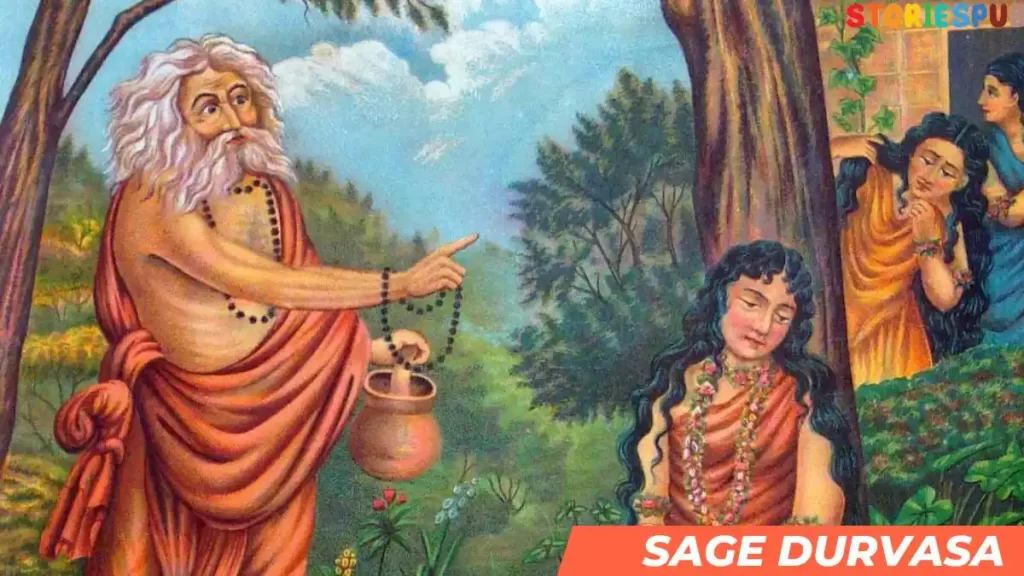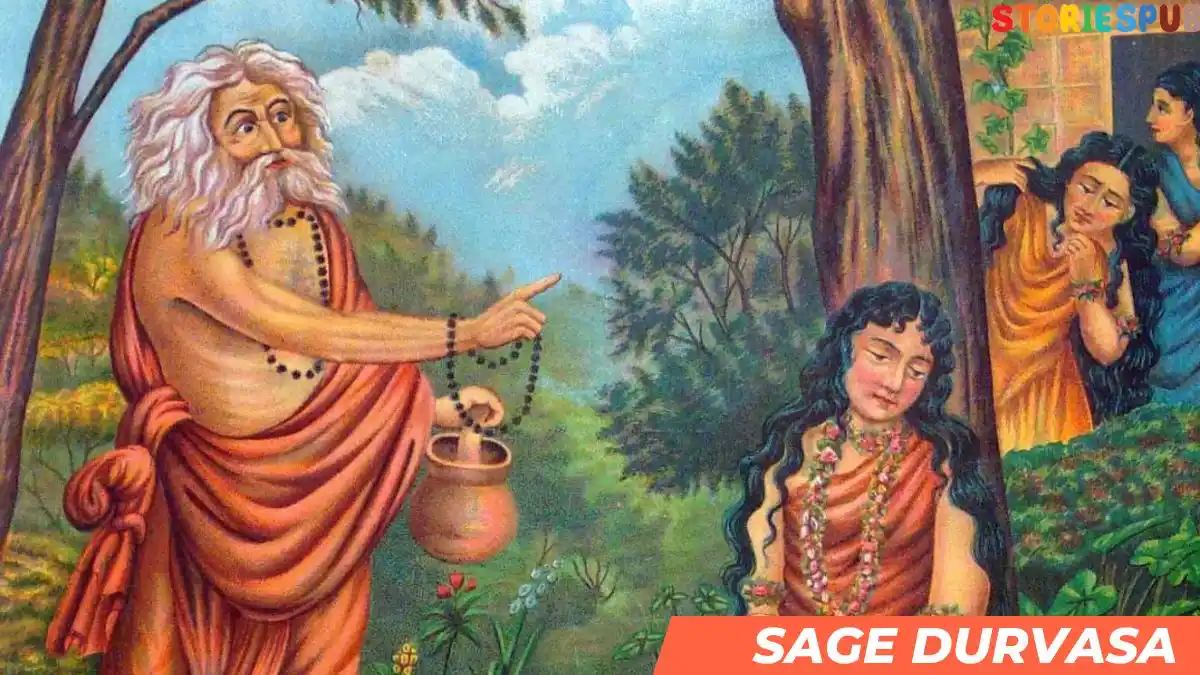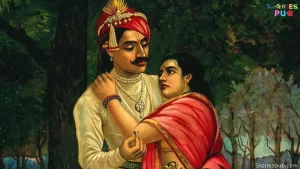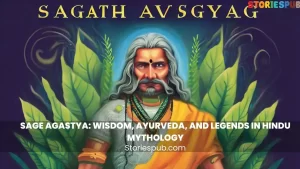A Story of Sage Durvasa: The Fickle Sage

In Indian mythology, Sage Durvasa is a prominent figure known for his wisdom, knowledge, and spiritual power. He was respected and revered, but he was also infamous for his fickle-mindedness and notorious temper. In this blog post, we will explore the life of Sage Durvasa, his stories, and the lessons we can learn from him.
Who was Sage Durvasa in Indian mythology?
According to Hindu mythology, Sage Durvasa was the son of Sage Atri and Anasuya, who were also renowned sages. He was born in a Brahmin family and was believed to have been born out of Lord Shiva’s blessings. Sage Durvasa’s mother, Anasuya, was known for her devotion and purity, which earned her the title of Pativrata (devoted wife).
Sage Durvasa grew up in a highly spiritual environment, surrounded by his parents and other sages. He was known for his immense intelligence and quickly gained a reputation as a great scholar and sage. He was also deeply devoted to Lord Shiva and was said to have received many blessings and spiritual powers from him.
Despite his many positive qualities, Sage Durvasa was also known for his fickle-minded nature and notorious temper. He was easily angered and was not afraid to use his powers to curse those who had offended him.
Sage Durvasa is associated with several famous incidents in Hindu mythology, such as his encounter with King Ambarisha, Draupadi, Kunti, and Sudama. He is also known for his role in the epic Mahabharata, where he played a significant part in several key moments.
What is the significance of Sage Durvasa’s curse?
In Hindu culture, sages and divine beings are highly revered and are believed to possess immense spiritual power. Disrespecting them can result in severe consequences, as demonstrated by Sage Durvasa’s curse.
The curse of Sage Durvasa is often seen as a cautionary tale and a reminder of the importance of respecting spiritual figures. It emphasizes the notion that even small acts of disrespect can have significant consequences and serves as a warning against being careless in our behavior towards divine beings.
Moreover, the story also highlights the power of curses in Hindu mythology. The curses of sages and divine beings are believed to have immense power and can affect entire families and even generations. In some cases, the effects of a curse can last for years and have far-reaching consequences.
Famous incidents associated with Sage Durvasa?
Sage Durvasa and King Ambarisha:
The story of Sage Durvasa and King Ambarisha is a famous incident in Indian mythology that highlights the importance of devotion and faith. King Ambarisha was known for his piety and devotion to Lord Vishnu. He invited Sage Durvasa to his palace and treated him with utmost respect and hospitality. Durvasa was pleased with the king’s hospitality and gave him a divine fruit as a blessing.
However, as fate would have it, Ambarisha was confronted by a situation that required him to break his fast. He ate a leaf from a tree to avoid any sin, but Sage Durvasa, who had returned to the palace, saw it as a sign of disrespect. He cursed the king, and his anger caused a chain reaction that threatened the world’s balance.
The curse had a significant impact on Ambarisha’s life and left him with dire consequences. However, Lord Vishnu intervened and saved him from the curse’s full effects. The story of Sage Durvasa and Ambarisha is often cited as an example of the importance of devotion and faith in Indian culture.
Moreover, the story also highlights the consequences of disrespecting sages and divine beings in Hindu mythology. Sage Durvasa was highly revered, and disrespecting him had severe consequences for King Ambarisha.
Sage Durvasa and Draupadi:
According to the story, Sage Durvasa and his disciples were invited to a feast by the Pandavas, who were the five brothers and the main protagonists in the epic Mahabharata. However, when Draupadi, the wife of the Pandavas, was asked to serve them, she ran out of food.
Sage Durvasa saw this as a sign of disrespect and cursed the Pandavas, saying that they would lose everything they owned. This curse ultimately led to the Pandavas’ exile and their eventual battle with their cousins, the Kauravas.
The story highlights the importance of respect and hospitality in Indian mythology. Sages and divine beings are highly revered in Hindu culture, and disrespecting them can have severe consequences.
Moreover, the story also shows the power of curses in Indian mythology. The curse of Sage Durvasa had far-reaching consequences and ultimately led to the Pandavas’ downfall.
Sage Durvasa and Kunti:
According to the story, Kunti was living in the forest with her husband when Sage Durvasa visited them. Kunti served him with great devotion, and the sage was pleased with her hospitality. As a reward, Sage Durvasa gave her a mantra that would allow her to summon any god and bear children with them.
Kunti was curious and wanted to test the power of the mantra. She summoned the Sun God and bore a child, Karna, out of wedlock. However, fearing the social stigma, Kunti abandoned Karna, who was later adopted by a charioteer.
The story highlights the power of mantras and how they can have significant consequences. It also teaches us about the importance of responsibility and the consequences of our actions. Kunti’s curiosity led to the birth of Karna, who faced many challenges throughout his life due to his illegitimate birth.
Moreover, the story also highlights the importance of hospitality and devotion in Indian mythology. Kunti’s devotion to Sage Durvasa earned her his blessing, but her curiosity led to an unwanted consequence.
Sage Durvasa and Sudama:
According to the story, Sudama was a poor Brahmin, and Sage Durvasa was his guru. Sudama was a devoted disciple of Durvasa and learned divine knowledge and spiritual power from him.
Later in life, Sudama faced financial difficulties and decided to visit his guru, Sage Durvasa, seeking his help. Sudama arrived at Sage Durvasa’s ashram, but he was hesitant to ask for anything directly. Sage Durvasa, who knew of Sudama’s troubles, asked him about his well-being and offered him food and shelter.
Overwhelmed by Sage Durvasa’s kindness, Sudama remained at the ashram for some time. One day, Sage Durvasa blessed Sudama with wealth and prosperity, which solved all his financial difficulties.
The story highlights the importance of devotion and blessings in Indian mythology. It also emphasizes the significance of a guru in shaping the spiritual journey of a disciple. The relationship between a guru and a disciple is a sacred one in Indian culture, and the story of Sage Durvasa and Sudama shows us the power of this bond.
Moreover, the story teaches us about the importance of humility and gratitude. Sudama did not ask for anything directly but was grateful for Sage Durvasa’s kindness and blessings. He remained humble and devoted, which earned him the guru’s blessings.
Sage Durvasa and Indra:
According to the story, Indra, the king of the Devas, approached Sage Durvasa seeking his blessing for the upcoming battle against the demons. However, Durvasa was in a bad mood that day and did not take kindly to Indra’s request. In a fit of rage, he cursed Indra and withdrew his support from the Devas.
As a result of Durvasa’s curse, the Devas were defeated by the demons in the ensuing battle. The story highlights the dangers of anger and arrogance and how they can lead to disastrous consequences.
Moreover, the story also teaches us about the importance of respect and humility in Indian mythology. Even though Indra was the king of the Devas, he still showed respect towards Sage Durvasa and sought his blessing. However, Durvasa’s bad mood and arrogance led to the downfall of the Devas.
The story of Sage Durvasa and Indra reminds us that respect and humility are essential qualities that can help us succeed in life. It also highlights the power of blessings and curses in Indian mythology and shows how they can impact our lives.
Sage Durvasa and the Ocean:
According to the story, the Devas, who were the Gods in Hindu mythology, approached Sage Durvasa seeking his help to obtain Amrita, the elixir of life. Sage Durvasa advised them to churn the ocean, which would release the Amrita. The Devas followed his instructions, but the churning of the ocean caused several dangerous creatures to emerge from it, such as the poison Halahala and the demon Madhu.
The Devas were unable to control these dangerous creatures, and they turned to Sage Durvasa for help. Sage Durvasa advised them to chant Lord Vishnu’s name, which would calm the creatures and help the Devas obtain the Amrita. The Devas followed his advice, and the chanting of Lord Vishnu’s name calmed the creatures, enabling them to obtain the elixir of life.
The story highlights the immense knowledge and spiritual power of Sage Durvasa. He was able to solve a seemingly impossible problem and help the Devas obtain the elixir of life. Moreover, the story also highlights the importance of faith and devotion in Indian mythology. The chanting of Lord Vishnu’s name shows the power of devotion and faith in overcoming challenges and obstacles.
Sage Durvasa and Lord Krishna:
According to the story, Sage Durvasa visited Lord Krishna, who was playing with his friends. Durvasa demanded that Lord Krishna give him some food, and Krishna obliged. However, Krishna gave him a small portion of food, which Durvasa found insulting. In a fit of anger, Durvasa cursed Krishna, and then he left.
When Durvasa returned home, he found that the food that Krishna had given him had turned to ash. He realized that Lord Krishna had used his divine power to teach him a lesson about the importance of humility. Durvasa realized his mistake and begged Lord Krishna for forgiveness.
The story highlights the importance of humility and the consequences of arrogance. Even a small act of disrespect can have significant consequences. Lord Krishna used his divine power to teach Sage Durvasa a valuable lesson, which helped him realize the importance of humility.
The story also highlights Lord Krishna’s compassion and forgiveness. Despite being cursed, he forgave Sage Durvasa and helped him learn the importance of humility. Lord Krishna is known for his wisdom and compassion in Indian mythology, and the story shows the importance of these qualities.
Sage Durvasa and Lord Shiva:
The story of Sage Durvasa and Lord Shiva is a well-known tale in Indian mythology that highlights the close relationship between a father and son, and the power of devotion.
According to the story, Sage Durvasa was the son of Lord Shiva and the two had a close bond. In one instance, Durvasa tested Shiva’s devotion by placing a flower garland on him. Shiva accepted the garland, but his wife Parvati saw it as a sign of disrespect and cursed Durvasa. As a result, Sage Durvasa lost his divine powers and became mortal.
Realizing his mistake and the consequences of his actions, Sage Durvasa turned to Lord Shiva for help. Lord Shiva, who loved and respected his son, intervened and restored Durvasa’s powers. This showed the power of Lord Shiva’s love and devotion for his son and the importance of forgiveness and redemption in Indian mythology.
The story of Sage Durvasa and Lord Shiva also teaches us about the consequences of our actions and the importance of respecting others. Sage Durvasa’s impulsive actions led to his downfall, but it was his father’s love and devotion that saved him.
Moreover, the story also highlights the power of devotion and love between a father and son. Lord Shiva’s love for his son was so great that he was willing to intervene and restore his powers. It shows the importance of maintaining strong relationships with family and loved ones, and the power of love and devotion in overcoming obstacles.
Sage Durvasa and Rishi Mudgal:
The story of Sage Durvasa and Rishi Mudgal is a beautiful example of the importance of devotion and the power of blessings. According to the story, during a time of drought, Sage Durvasa visited Rishi Mudgal’s ashram. As per the Indian tradition of offering food to guests, Rishi Mudgal offered Durvasa some food. But, he did not have any food to offer him as there was a scarcity of food due to the drought.
Rishi Mudgal, being a devoted disciple of Durvasa, did not want to send him away empty-handed. So, he offered him a handful of sand, which was the only thing he had to offer. Durvasa, who was known for his notorious temper, was pleased with Mudgal’s devotion and selflessness. He blessed Mudgal and his ashram with rain, ending the drought.
The story teaches us that devotion and selflessness are more important than material offerings. Even a small offering given with pure devotion can please the divine and attract their blessings. Sage Durvasa was known for his power and temper, but he recognized and appreciated Mudgal’s devotion, which shows the importance of devotion in Indian mythology.
Qualities of Sage Durvasa?
Sage Durvasa is one of the most respected and revered sages in Indian mythology, known for his immense knowledge, spiritual power, and fickle-minded nature. Some of the key qualities associated with Sage Durvasa are:
Intelligence: Sage Durvasa is known for his immense intelligence and knowledge in various fields of study, including Vedas, scriptures, and philosophy.
Spiritual power: Sage Durvasa is believed to possess immense spiritual power and has the ability to perform miracles and grant blessings.
Fickle-mindedness: Sage Durvasa is known for his fickle-minded nature, which can sometimes lead to anger and curses.
Devotion: Despite his temperamental nature, Sage Durvasa is deeply devoted to his gurus and deities, and his devotion has earned him many blessings and spiritual power.
Honesty: Sage Durvasa is known for his honesty and integrity and is never afraid to speak his mind, even if it means offending others.
Austerity: Sage Durvasa is believed to have lived a life of great austerity, often practicing severe penances and fasting to attain spiritual enlightenment.
Discipline: Sage Durvasa is known for his strict discipline and adherence to religious and spiritual practices.
Overall, Sage Durvasa is considered one of the most powerful and respected sages in Hindu mythology, with a complex personality that includes both positive and negative qualities.
A Story of Sage Durvasa FAQ
What are the famous stories associated with Sage Durvasa?
Some of the famous stories associated with Sage Durvasa include his encounter with King Ambarisha, Draupadi, Kunti, Sudama, and Lord Krishna.
What is the significance of Sage Durvasa's curse?
Sage Durvasa's curse serves as a cautionary tale and a reminder of the importance of respecting sages and divine beings. It also highlights the power of curses in Hindu mythology.
What are the qualities of Sage Durvasa?
Sage Durvasa was known for his intelligence, knowledge, spiritual power, and fickle-minded nature.
How did Sage Durvasa get his name?
Sage Durvasa got his name from Lord Shiva, who named him after the word "durvasha," which means "one who is difficult to live with."
What was Sage Durvasa's relationship with Lord Shiva?
Sage Durvasa was the son of Lord Shiva and had a close relationship with him. He was also deeply devoted to Lord Shiva and received many blessings and spiritual powers from him.
What was Sage Durvasa's role in the Mahabharata?
Sage Durvasa played a significant role in the epic Mahabharata, where he impacted several key moments and interacted with various characters.
What are the famous quotes of Sage Durvasa?
Some of the famous quotes attributed to Sage Durvasa include "Control your anger, lest it controls you," and "True knowledge lies in knowing oneself."
What are the lessons we can learn from Sage Durvasa's life?
We can learn several lessons from Sage Durvasa's life, such as the importance of devotion and respect, the consequences of disrespecting sages, and the power of curses in Hindu mythology.
Why is Sage Durvasa still revered in Indian culture?
Sage Durvasa is still revered in Indian culture due to his immense knowledge and spiritual power, his close relationship with Lord Shiva, and the lessons we can learn from his life and stories.
Hey kids, how much did you like The The Epic Story of Sage Vishwamitra? Please share your view in the comment box. Also, please share this story with your friends on social media so they can also enjoy it, and for more such Hindu Mythology, , please bookmark storiespub.com.
Check out other stories that we have:





